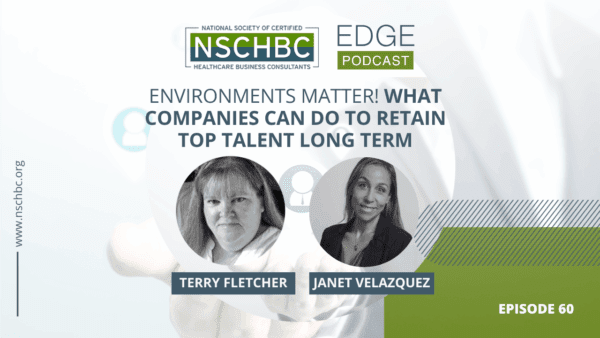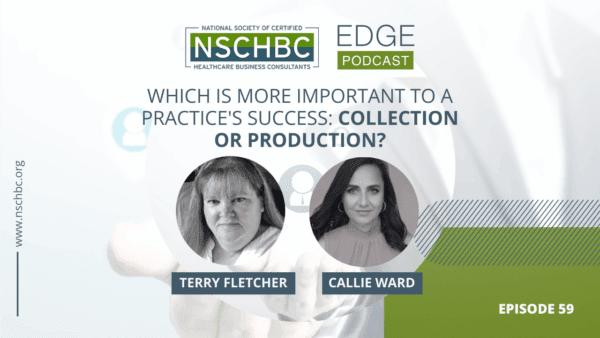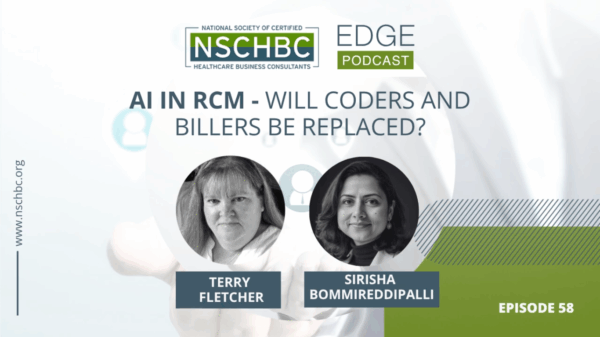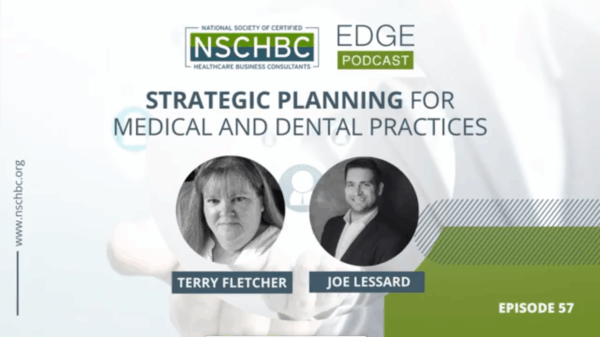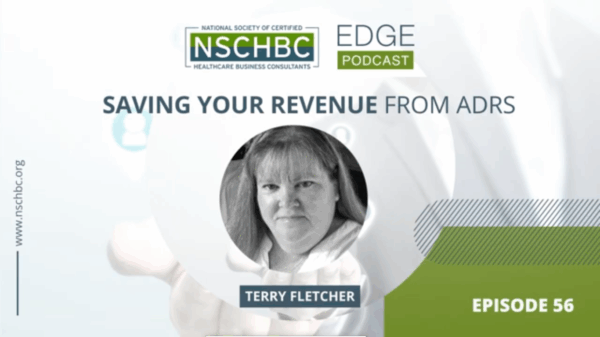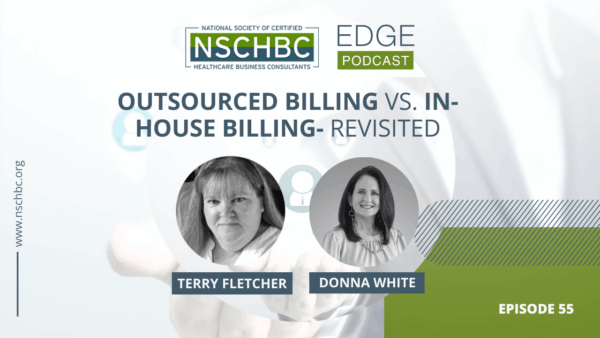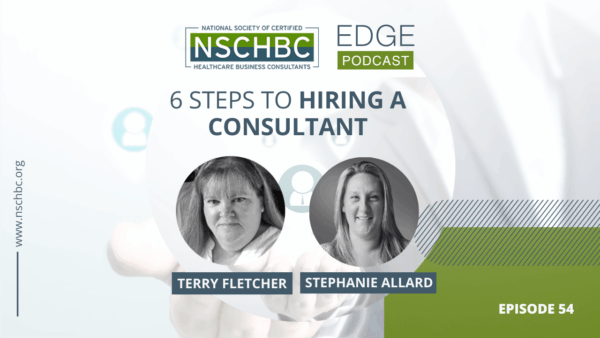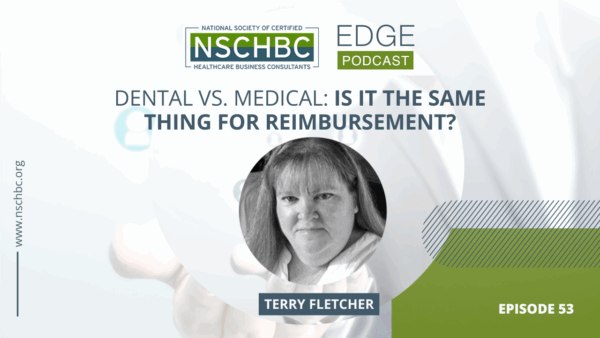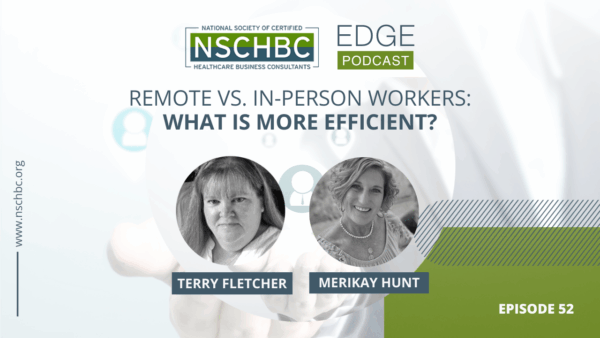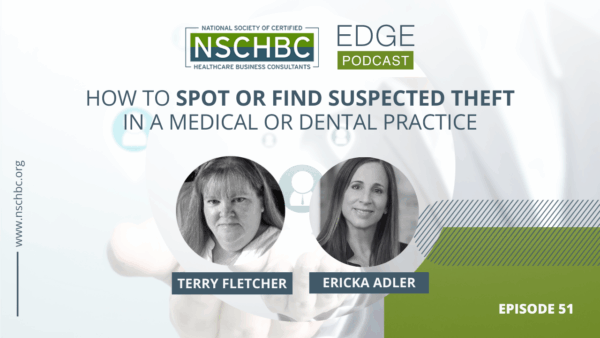This week on the Edge Podcast, our host and NSCHBC member Terry Fletcher, will give our listeners, a few updates for your medical practices that came out of the 43-day government shutdown that ended on November 12th. As you know as of October 1st, many services were stalled or expired without Congress in session including Telehealth, Hospital at home, and funding for many government services including $40 billion for rural health centers.
Financial Agreements with Patients for a Healthy RCM
When securing the patient’s share of cost for medical services, what is the minimum that should be done, and should this also be taught to back-office staff not just f/o or billing? How does the NSA impact financial agreements for patients? Who enforces these policies? and what if a 3rd party billing service is involved? All of these questions and answers are addressed today in this month’s episode of the Edge Podcast, with host Terry Fletcher and fellow NSCHBC member Laureen Murphy of MedCycle Solutions.
Environments Matter! What companies can do to retain top talent long term
In this episode of the Edge Podcast, Terry welcomes NSCHBC member Janet Velazquez of JV Practice Solutions for a timely discussion on what it really takes to retain top talent in today’s healthcare landscape. It’s not just about competitive pay and benefits. Companies must foster a positive, inclusive, and supportive work environment—but what does that look like in practice? Are healthcare organizations offering growth opportunities, flexibility, and a culture that inspires long-term loyalty?
Which is more important to a practice’s success: collection or production?
In this episode of the Edge Podcast, Terry welcomes Dental consultant, Callie Ward, to discuss that robust collections are absolutely crucial to translate production into actual revenue and profit. A practice with excellent production but weak collections will struggle financially and how to make sure practice success.
AI in RCM: Will Coders and Billers Be Replaced?
In this episode of the Edge Podcast, Terry and her guest, NSCHBC member and consultant Joe Lessard, discuss how to advise clients on critical business decisions for medical and dental practices. They cover topics such as Insurance acceptance, Hiring strategies, Location expansion, Operational scaling, Equipment acquisition. Tune in for expert insights on practice management, financial planning for healthcare practices, and growth strategies for medical and dental clinics.
Strategic Planning for Medical and Dental Practices
In this episode of the Edge Podcast, Terry and her guest, NSCHBC member and consultant Joe Lessard, discuss how to advise clients on critical business decisions for medical and dental practices. They cover topics such as Insurance acceptance, Hiring strategies, Location expansion, Operational scaling, Equipment acquisition. Tune in for expert insights on practice management, financial planning for healthcare practices, and growth strategies for medical and dental clinics.
Saving your revenue from ADRs
In the context of medical and/or dental insurance, ADR refers to Additional Documentation Request. This is a request from an insurance payer (like Medicare) for additional records to support a claim. It’s not a sign of wrongdoing, but rather a way to ensure compliance with policies and verify the validity of claims. Ignoring these requests, or failure to meet their deadlines, can result in a loss of revenue and trigger additional payers’ audits and ADR’s. Terry outlines the ADRs and best practices to make sure your staff is on top of these requests, which helps save your revenue.
Outsourced Billing vs. In-House Billing Revisited
In-house billing offers enhanced internal control and potential return on investment but entails higher costs and staffing challenges. Conversely, outsourcing is cost-effective, transparent, and consistent but may result in skewed control of financial operations and introduce hidden costs. Terry discusses this important topic with healthcare consultant Donna White, covering the best option for different-sized practices.
6 Steps to Hiring a Consultant
On this edition of the Edge Podcast, Terry welcomes Healthcare Compliance Consultant, Stephanie Allard. The hosts discuss objectives when hiring an external consultant, such as budgets, objectives, outcomes, expectations, and more. Tune into this important and informative episode to make sure you are prepared.
Dental vs. Medical: Is it the same thing for reimbursement?
Terry Fletcher discusses the similarities, differences, and where crossover between dental and medical billing. Tune in for advice that can assist clients on both sides to be accurate in their coding and billing processes.
Remote vs. In-Person Workers: What is More Efficient?
This month on the NSCHBC Edge Podcast, Terry welcomes back, NSCHBC member, Merikay Hunt CHBC, to discuss the pros and cons of a remote versus in-person versus hybrid workforce. When comparing corporate and healthcare sectors, remote work generally tends to be a better option for corporate roles due to the nature of many corporate jobs being more easily adaptable to digital platforms. However, healthcare often requires in-person patient interaction, making remote work less feasible in most cases. The best choice depends on the specific role and individual needs within each sector.
How to spot or find suspected theft in a medical or dental practice
On today’s NSCHBC Edge Podcast, Terry speaks with healthcare attorney and fellow NSCHBC member, Ericka Adler, to identify suspected theft in a medical practice. Terry and Ericka discuss how to identify and prevent theft, plus educate your staff and providers so you are aware of potential red flags. Some areas to focus on include cash handling, prescription drug inventory, and billing practices. The hosts also talk about what to do if you find suspicious activity, how you can further investigate with the use of proper documentation, and the potential involvement of external auditors or legal counsel.




